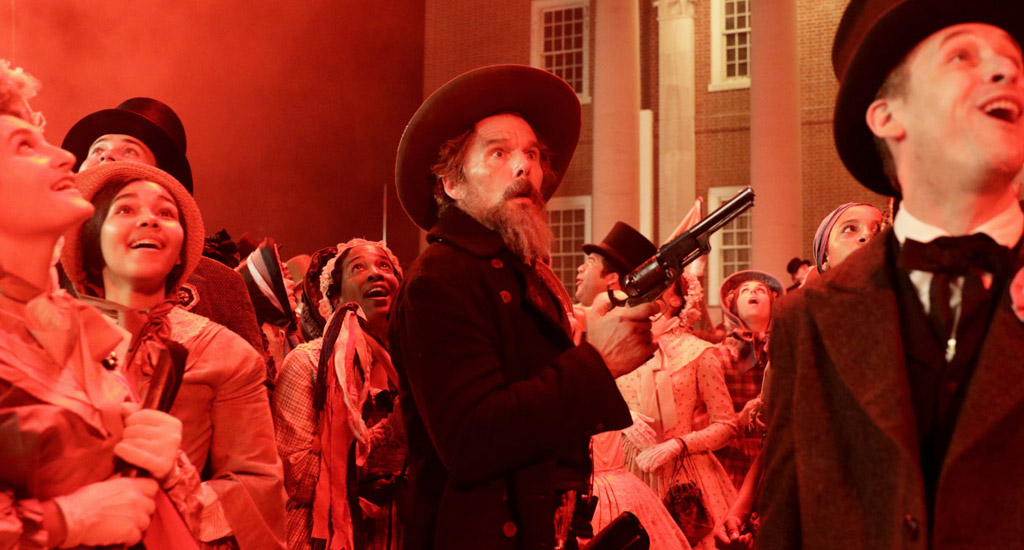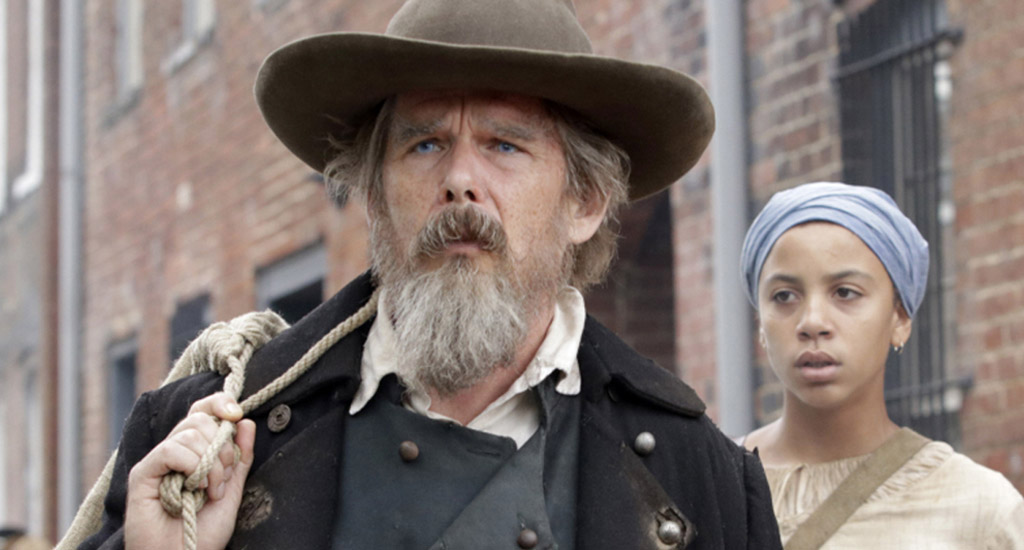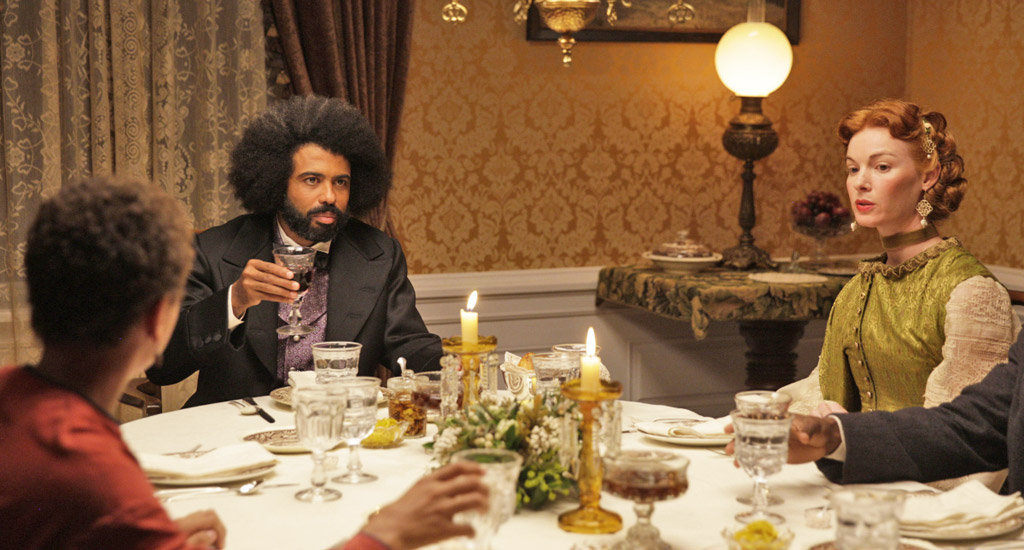
Ethan Hawke isn’t a flashy actor, for the most part. Nor is he an actor who, other than his work, attracts attention to himself. He simply, you know, works, which might be part of why (despite four Academy nominations, and being arguably robbed for another with 2018’s First Reformed) he’s never won an Oscar. He doesn’t play the awards game in a traditional sense, and in fact, he previously deconstructed the game while admitting to admiring Patti Smith for saying that she wanted every damn award and staying pretty casual on the subject himself. His almost zen approach is as interesting as watching super-successful award campaigns go down, and I have a hunch that we’ll be able to observe what he does following an Emmy nod next year.
Hawke burns so brightly that he’s incandescent in The Good Lord Bird, and it’s thrilling to see him command the small screen in a different way than he’s pulled off in cinemas. The limited series premiered on October 4, so you’re not too far behind if you missed the debut, but you really ought to catch up now. It’s a show that is best savored one episode at a time, so binging it later may not be as much of a good time.
As the fire-spewing abolitionist John Brown, Hawke delivers a showy and forceful performance that cannot be downplayed. It’s an unusually brash turn from him, after he’s played so many different vibes already, from his desk-standing moves in Dead Poets Society to a stream of slacker characters and romantic leads. Lately, his role choices have grown increasingly more diverse, including characters afflicted with inner turmoil and the occasional weirdo who shreds scenery. And then there’s a phase that I found especially interesting: The Purge and Sinister. In those horror movies, Hawke could, you know, lose his sh*t onscreen while playing two very different fatherly roles. He’s so adept at taking his audience along with them, that they, too, lose their sh*t. It’s a blast to watch people lose their sh*t and share in the communal sh*t-losing experience.
Hawke loved making those horror movies, too. As weird as it sounds, years later, I really feel like those films were a precursor to Hawke losing his sh*t in an altogether different way in The Good Lord Bird. He does so extravagantly, and like I noted already, this series is still young. I don’t want to spoil the experience for you by revealing too much. But it’s a wonderfully bizarre show. It realizes the ridiculousness of Hawke’s character, who remains a controversial figure of U.S. history, but it also celebrates his spirit. It’s a precarious balance to attempt, but the show (along with Hawke) pulls it off, somehow with humor, much like James McBride’s novel of the same name.

We so rarely get to see Hawke let loose like this, and he’s not only a hired gun, so to speak, but he helped make this project happen. He executive produced and co-wrote the scripts, which follow the perspective of a (fictional) teenage male slave, Henry (Joshua Caleb Johnson); John picks him up in pre-Civil War Kansas while mistaking him for a girl and affectionately dubbing him as “Onion.” He bears witness to John’s ragtag army while wielding weapons and wearing cumbersome antebellum attire, which adds to the show’s absurdity. It’s Onion who considers the white-savior factor of Brown’s threadbare plans. Yet as McBride stated of his book, this is not the story of the white savior as typically presented. Instead, “it’s the African-American perspective on the white savior that comes to save us, and that’s why it’s so funny. It’s a story of caricature.”
Hawke hurls himself into that caricature, one of a man who believes that he’s truly possessed by the spirit of God, and it’s a trip.
The thing is, Brown might be a bit of a homicidal maniac who’s prone to shoot any white man who won’t renounce slavery. He’s also got very little in the way of a plan, but that’s no shocker, since we see his ultimate fate at the beginning of the Good Lord Bird. Still, it’s a rip-roaring ride to watch Brown tearing across the country, including the 1859 Army depot raid at Harpers Ferry. He’d hoped to incite an armed slave revolt, thereby sending the institution of slavery down the toilet. The raid didn’t turn out so well for him, but it did contribute to enough of a divided North and South to help spark the Civil War.
What’s also fascinating is how Hawke originally envisioned Jeff Bridges as Brown, which would have brought some Dude-like swagger for sure, but I prefer Hawke’s take. There are moments when he’s bellowing with spittle flying onto his beard, his entire body shaking. Hawke has so much fun leaning into both the insane and heroic aspects of his character, and above all, his sincerity. John fervently insisted upon fueling the cause of ending slavery, even if his showiness and enormously flawed strategy is what ultimately took him down. That Hawke can manage to treat such a serious subject with both humanity and humor is awe-inspiring. Another highlight would be Brown’s flashy interactions with Frederick Douglass (Daveed Diggs), who brings his own self-assured presence while urging John to be a careful negotiator. Douglass, too, is portrayed as dabbling in his own brand of excess. This scene reflects quite a dinner party, by the way.

For decades, Hawke has remained one of his generation’s finest actors and achieved longevity after many of his peers (to borrow Neil Young’s lyrics) have burned out or faded away. And yes, The Good Lord Bird, on its face, might look heavy, but the truth is that it’s therapeutically funny stuff. Ethan Hawke rarely gets to provoke laughs like this except in flashes. I recall giggling at how jackass-y his Reality Bites character was, for example, and I’ve already mentioned the scenery-chewing of Stockholm, although that film didn’t receive much of a box-office run. However, Hawke being uproariously, darkly funny is available now on the small screen, and the world would be as much of a periodic fool as John Brown to pass it up.
Showtime’s ‘The Good Lord Bird’ airs on Sunday nights at 9:00pm EST.
